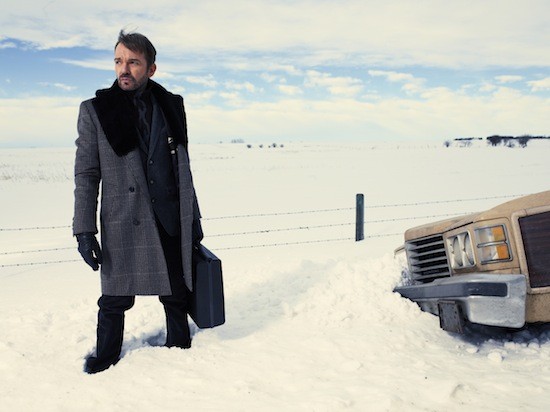Fargo (Season One) (2014; dirs. Randall Einhorn, Adam Bernstein, Colin Bucksey, Matt Shakman, and Scott Winant)—Last year, HBO’s True Detective introduced millions of TV viewers to the pleasures of well-constructed, stand-alone crime serials and Matthew McConaughey’s drawling, freshman-year gibberish about What It All Means. So if you’re looking to kill some time between now and True Detective’s Season Two premiere this Sunday, might I suggest that you binge-watch FX’s ten-episode riff on one of the most overrated Coen brothers movies? Trust me, it will be worth your while.

I’m a film guy first and foremost, but it’s pretty much indisputable that Fargo the series is visually richer and more imaginative than Fargo the movie. For once, the tight, slick, mostly motionless close-ups that caulk most TV dramas conjure menace and mystery instead of underscoring their bland, plot-driven functionality and expediency. The episode directors can do flashy and tricky, too: there’s a two-minute massacre shot from the exterior of a building that simultaneously recalls Robert Bresson’s sound-over-image primacy and an extended joke in a Droopy Dog cartoon.
But executive producer and head writer Noah Hawley’s debt to recent, much better Coen brothers films like No Country For Old Men, True Grit, Burn After Reading and especially A Serious Man is apparent. Like those films, Hawley’s Fargo cultivates an atmosphere of spiritual exhaustion and existential resignation. The good people in his show also struggle mightily with perhaps the key question of human existence: in a world where crime, violence and general human venality are without measure, what’s the point of trying to fight it?
Although stubborn, resourceful Bemidji police deputy Molly Solverson (the miraculous Alison Tolman) is less concerned with this dilemma than bumbling Duluth police officer Gus Grimley (the seldom-better Colin Hanks), both of them bond over their numerous frightening run-ins with the snakes and predators at large in their respective necks of the woods. Solverson’s chief nemesis is the insurance salesman-turned-murderer Lester Nygaard (Martin Freeman, wondrously furtive and unlikeable), while Grimley’s boogeyman is the sadistic, sardonic Anton Chigurgh clone Lorne Malvo (Billy Bob Thornton, wondrously terrifying and unstoppable). Realism is shown the door after the first episode, which makes the series’ fabulist elements go down easier and makes the opening-shot assertion that “THIS IS A TRUE STORY” funnier every time it appears.
Most importantly, Hawley’s storytelling and characterization actually dignifies the aw-shirr folks of the upper Midwest instead of setting them up for cheap, you-talk-funny laughs. His dialogue reveals both the heroic stoicism of the expression “Aw, geez” and the hidden poetry of monosyllabic dialogue. (Some examples: “Here it is. You’re screwed”; “I don’t want to die in this way”; “You know what wolves do. They hunt; “God told you not to park here?” ; “You live in the world. What do you think?”) How good is this show, then? So darn good I watched the whole thing straight through twice.
Grade: A